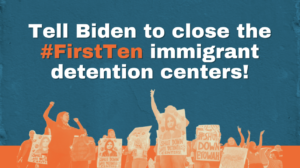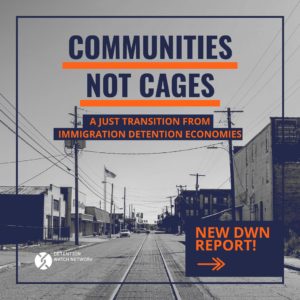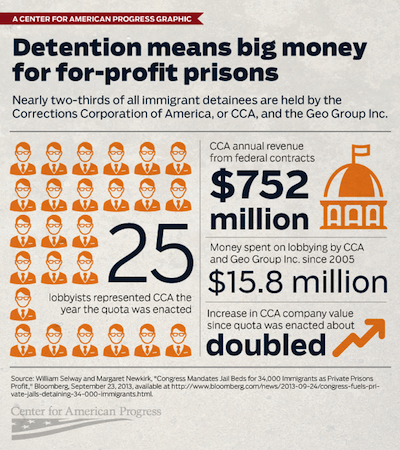In May 2021, Two Detention Centers Closed!
The Biden administration announced May 20th that ICE will cut the contracts and shut down two immigrant detention centers, both under investigations for egregious rights violations: the Irwin County Detention Center in GA and the Bristol County Detention Center in MA. Shocking revelations of abuse, medical neglect and malpractice have been cited at the Irwin Detention Center, with documented reports of women detainees having been victims of gynecological procedures performed without their consent (see this powerful documentary about the medical suit against Irwin here). Allegations were brought forward by brave detainees and a whistleblower, Dawn Wooten, who was a nurse at the facility. Bristol Detention Center is also under investigation for abuse and rights violations — tactics of retaliation against detainees who came forward with complaints.
This is a major win for local and national advocates who have worked for years to shut down these facilities. As with the news above, our collective celebration is accompanied by the knowledge that much more must be done. We urge the Biden administration to continue this progress and to:
- release — not simply transfer — all detainees in these facilities;
- conduct an immediate review of all ICE detention centers and move towards their closure (they are also known for persistent neglect and abuse of detainees, including the rampant spread of Covid due to their shameful policies and practices); and
- end the system of immigration detention and allow migrants and refugees to pursue their cases reunited with their families and living in their communities.
TAKE ACTION!
1. Join us in calling for releases not transfers! #FreeThemAll
Phone Numbers for: White House: 202-456-1111 & ICE Headquarters: 202-732-3000
Sample Script:
“Hi, my name is _______, and I am calling to urge that people in ICE custody at the Irwin Detention Center in GA and at Bristol County in MA, and beyond, be released and not transferred to another detention center. We urge the White House and ICE to release everyone so they can navigate their case in community, not behind bars in detention during a deadly global pandemic. Thank you.”

2. Sign the Petition to Close the #FirstTen
NNIRR, as a member of Detention Watch Network, is circulating this DWN petition to demand Biden close the #FirstTen immigrant detention centers.
The facilities on this list represent every facility across the country where medical neglect is common, physical and sexual abuse are widely reported, basic necessities are lacking, food is rotten, access to counsel and support is restricted, and immigrants needlessly suffer. This list provides a roadmap, a #FirstTen to communities not cages.
 This new report Communities Not Cages (May 2021) from Detention Watch Network provides a much-needed analysis and vision for incorporating the de-criminalization of immigration and the need to invest in communities as part of our “just transition”!
This new report Communities Not Cages (May 2021) from Detention Watch Network provides a much-needed analysis and vision for incorporating the de-criminalization of immigration and the need to invest in communities as part of our “just transition”!
“Prison developers have often pitched detention centers to struggling communities as economic engines, but there is no evidence they actually create long-term positive development,” said Bob Libal, who authored the report. “Creating a transition plan away from detention economies creates a path for more healthy communities not dependent on the harm caused by immigration detention centers.”
Background on Detention & Policies that Criminalize Migrants
Current border policies and legislation are fixed to a framework of criminalization and punishment. Through “prevention through deterrence” strategies employed by the Department of Homeland Security, U.S. Immigration and Customs Enforcement and Customs and Border Protection, such as the Consequence Delivery System and Operation Streamline, immigration policy is approached from a criminal justice standpoint. Under “zero-tolerance” guidelines unauthorized entry is treated as a federal misdemeanor, unauthorized re-entry, a felony. Detention and deportation are used as punishments in order to dissuade potential attempts to re-enter the U.S.
Within this system, migrants are denied due process and prosecuted en masse in accelerated trials wherein the judges are stripped of prosecutorial discretion. This process of criminalization in turn feeds into increasing rates of detention that are even further augmented by increasing collaboration between local law enforcement and immigration agents. The articles, reports and short films below provide in-depth analysis of how these policies are imbued with exploitation for the sake of corporate interests.
- Center for Victims of Torture produced this backgrounder (July 2021) “Arbitrary & Cruel: How U.S. Immigration Detention Violates the Convention against Torture and Other International Obligations” that shows how the dehumanizing and cruel policies and practices in the immigration detention system lead to violations of the Convention against Torture, and makes the case that the system must be eliminated for the United States to comply with international law.
- No More Deaths Prison Industrial Complex Fact Sheet reviews basic tenets of the prison industrial complex and how it relates to immigration in regards to detention and policy.
- Brave New Films’ short documentary “Immigrants for Sale” exposes the complexities of the private prison industry in relation to the commodification of undocumented immigrants. “Immigrants for Sale” explains how corporate interests affect state and federal policies in order to engender mass incarceration. The video addresses the connections between private prison companies and state and federal policies including a discussion of Arizona’s SB 1070, the American Legislative Exchange Council (ALEC), political lobbying, Geo Group and Corrections Corporation of America, as well as an examination of the harsh conditions within the detention centers and the relationship between these detention centers and the surrounding communities.
- Grassroots Leadership report “Payoff: How Congress Ensures Private Prison Profit with an Immigrant Detention Quota” summarizes the origins of the immigrant detention quota and the privatization of the immigrant detention industry, examines the largest private prison corporations (GEO Group & CCA), pointing to how they lobby to increase profits, and attends to the human rights abuses that occur within detention facilities.
- Detention Watch Network & The Center for Constitutional Rights report Banking on Detention: Local Lockup Quotas and the Immigration Dragnet provides well-needed insight on the system of minimum occupancy quotas at immigration detention facilities throughout the country. These quotas act as contractual incentives or monetary obligations on behalf of the government to pay for a set number of detention beds. According to the report,
local lockup quotas that serve to protect the bottom line of private companies thus incentivize the imprisonment of immigrants.
 “Culpable” addresses how corporations profit from the criminalization of immigrants and how anti-immigration sentiments are used to influence policies and in turn increase detention populations. As the video states, “CCA has made $208 million in revenues just from contracts with Immigration and Customs Enforcement (ICE). It has also spent $23 million in lobbying over the last decade.” The short documentary explains how persecution “punishment” policies and sentencing laws such as those initiated by Operation Streamline are linked to the interests of for-profit incarceration corporations. The video features Caroline Isaacs of American Friends Service Committee, the former Arizona senator, Dennis DeConcini and Margo Cowan, the Pima County Public Defender.
“Culpable” addresses how corporations profit from the criminalization of immigrants and how anti-immigration sentiments are used to influence policies and in turn increase detention populations. As the video states, “CCA has made $208 million in revenues just from contracts with Immigration and Customs Enforcement (ICE). It has also spent $23 million in lobbying over the last decade.” The short documentary explains how persecution “punishment” policies and sentencing laws such as those initiated by Operation Streamline are linked to the interests of for-profit incarceration corporations. The video features Caroline Isaacs of American Friends Service Committee, the former Arizona senator, Dennis DeConcini and Margo Cowan, the Pima County Public Defender.
This AlterNet piece by Peter Cervantes-Gautschi “How the For-Profit Corporate Prison Lobby Killed Immigration Reform” speaks to how corporations that profit from the incarceration of immigrants surreptitiously lobby to prevent pro-immigrant laws from passing and advance anti-immigrant legislation that augments the criminalization of immigrants. This corporate power therefore is reliant on the manipulation of legislators.
In the report “Do Private Prisons Distort Justice? Evidence on Time Served and Recidivism,” Anita Mukherjee confirms that private prisons increase prisoners’ sentences by awarding more prisoners with infractions, which delay their release. Similarly, these extended sentences have no impact on the reduction of recidivism. Instead, private prisons operate in a manner attuned to profit enlargement, meaning increasing the number of people in need of imprisonment boosts profit.
NNIRR has signed onto several campaigns working to divest and defund the Private Prison Industry:
- Detention Watch Network
- DefundHate
- National Prison Divestment Campaign: National Prison Divestment Campaign
- Private Prison Divestment Campaign: Pension Divestment
